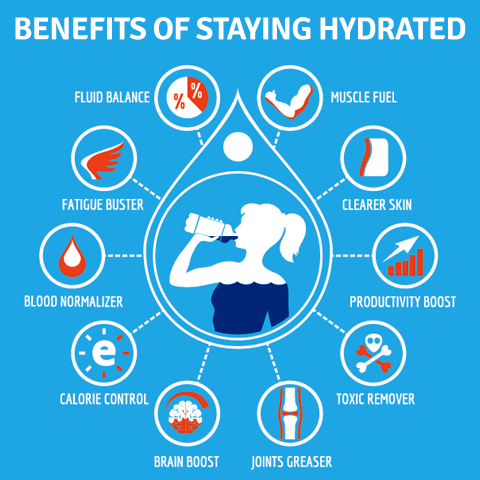The Importance of Hydration for Your Health
Water is essential for our bodies to function optimally. It plays a vital role in maintaining overall health and well-being. Every cell, tissue, and organ in our bodies needs water to work properly.
Benefits of Staying Hydrated
1. Enhances Physical Performance:
Staying hydrated helps to prevent dehydration, which can lead to reduced physical performance. Proper hydration ensures that your muscles and joints are well lubricated, reducing the risk of cramps and injuries during physical activities.
2. Supports Digestion:
Water aids in digestion by helping to break down food and absorb nutrients. It also helps prevent constipation by softening stool, promoting regular bowel movements.
3. Regulates Body Temperature:
Water acts as a coolant for our bodies, regulating body temperature through perspiration and maintaining the balance necessary for optimal functioning.
4. Promotes Healthy Skin:
Proper hydration enhances skin health, keeping it plump, supple, and glowing. It can reduce the appearance of wrinkles and fine lines, giving a more youthful appearance.
Signs of Dehydration
Dehydration occurs when the body loses more fluids than it takes in. It is important to recognize the signs of dehydration to maintain good health:
1. Increased Thirst:
Feeling very thirsty and unable to quench the thirst even with regular water intake can be a sign of dehydration.
2. Dark Yellow Urine:
Urine that is dark yellow or amber in color indicates dehydration. In a well-hydrated body, urine is usually pale yellow or straw-colored.
3. Fatigue and Lethargy:
A lack of sufficient fluid intake can lead to low energy levels and feeling fatigued throughout the day.
4. Dry Mouth and Skin:
When the body needs more water, the mouth may feel dry, and the skin may become dry and flaky.
Tips to Stay Hydrated
1. Drink Sufficient Water:
Make it a habit to drink enough water throughout the day. Keep a water bottle handy and sip on it regularly.
2. Consume Hydrating Foods:
Fruits and vegetables with high water content, such as watermelon, cucumbers, and oranges, can help boost hydration levels.
3. Limit Alcohol and Caffeine:
Alcoholic and caffeinated beverages can contribute to dehydration. Reduce consumption or balance it with increased water intake.
4. Set Reminders:
Use technology to your advantage by setting reminders or alarms to drink water at regular intervals.
5. Monitor Hydration during Exercise:
When engaging in physical activities, drink water before, during, and after the workout to replenish fluids lost through sweat.
Conclusion
In conclusion, proper hydration is crucial for maintaining good health. Water is essential for various bodily functions and plays a vital role in promoting overall well-being. By staying hydrated, you can enhance physical performance, support digestion, regulate body temperature, and promote healthy skin. Recognizing the signs of dehydration and following simple tips to stay hydrated can make a significant difference in your health and overall quality of life.


